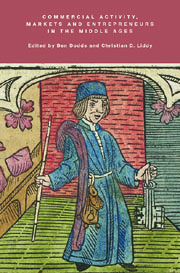 Commercial Activity, Markets and Entrepreneurs in the Middle Ages
Commercial Activity, Markets and Entrepreneurs in the Middle Ages Book contents
- Frontmatter
- Contents
- List of Figures
- List of Tables
- List of Contributors
- List of Abbreviations
- Richard Britnell: An Appreciation
- 1 Unreal Wages: Long-Run Living Standards and the ‘Golden Age’ of the Fifteenth Century
- 2 Minimum Wages and Unemployment Rates in Medieval England: The Case of Old Woodstock, Oxfordshire, 1256–1357
- 3 Crisis Management in London's Food Supply, 1250–1500
- 4 Grain Shortages in Late Medieval Towns
- 5 Market Regulation in Fifteenth-Century England
- 6 Self-Government in the Small Towns of Late Medieval England
- 7 Marketing and Trading Networks in Medieval Durham
- 8 Peasant Opportunities in Rural Durham: Land, Vills and Mills, 1400–1500
- 9 The Shipmaster as Entrepreneur in Medieval England
- 10 Cheating the Boss: Robert Carpenter's Embezzlement Instructions (1261×1268) and Employee Fraud in Medieval England
- 11 The Public Life of the Private Charter in Thirteenth-Century England
- 12 Luxury Goods in Medieval England
- Index of People and Places
- Bibliography of the Writings of Richard Britnell
- Tabula Gratulatoria
1 - Unreal Wages: Long-Run Living Standards and the ‘Golden Age’ of the Fifteenth Century
Published online by Cambridge University Press: 05 February 2013
- Frontmatter
- Contents
- List of Figures
- List of Tables
- List of Contributors
- List of Abbreviations
- Richard Britnell: An Appreciation
- 1 Unreal Wages: Long-Run Living Standards and the ‘Golden Age’ of the Fifteenth Century
- 2 Minimum Wages and Unemployment Rates in Medieval England: The Case of Old Woodstock, Oxfordshire, 1256–1357
- 3 Crisis Management in London's Food Supply, 1250–1500
- 4 Grain Shortages in Late Medieval Towns
- 5 Market Regulation in Fifteenth-Century England
- 6 Self-Government in the Small Towns of Late Medieval England
- 7 Marketing and Trading Networks in Medieval Durham
- 8 Peasant Opportunities in Rural Durham: Land, Vills and Mills, 1400–1500
- 9 The Shipmaster as Entrepreneur in Medieval England
- 10 Cheating the Boss: Robert Carpenter's Embezzlement Instructions (1261×1268) and Employee Fraud in Medieval England
- 11 The Public Life of the Private Charter in Thirteenth-Century England
- 12 Luxury Goods in Medieval England
- Index of People and Places
- Bibliography of the Writings of Richard Britnell
- Tabula Gratulatoria
Summary
Not many decades ago the long fifteenth century was a notoriously dark age in English history, neglected because it was located awkwardly between the ‘true’ Middle Ages and the early modern era. When at last it began to receive the attention it warranted, attempts to dispel the gloom were bedevilled by an ambition to fashion generalisations that fitted the whole experience of the 150 years after 1350, or even the quarter millennium from 1300 to 1550. As a result fundamental disagreements arose, the most notable being whether this era should be characterised by economic growth and prosperity or by recession and decline. However, contention cooled as more research was undertaken, topics on the agenda defined and prioritised, and more manageable chronologies adopted, along with a willingness to identify sub-periods and sectors whose characteristics differed in major respects. Confidence has now increased sufficiently to persuade us that we are close to achieving a full understanding of the economy and society of England at the close of the Middle Ages, and there are distinct signs of a consensus emerging, with optimistic epithets such as ‘Economic Growth’, ‘An Age of Ambition’, ‘A Golden Age of Prosperity’, ‘An Age of Transition’, ‘A Consumer Economy’ and ‘A New Middle Ages’ in the ascendant.
However, a little more probing reveals that there is much that remains mysterious about the era and paradoxical about attempts that have been made to describe and explain it.
- Type
- Chapter
- Information
- Commercial Activity, Markets and Entrepreneurs in the Middle AgesEssays in Honour of Richard Britnell, pp. 1 - 24Publisher: Boydell & BrewerPrint publication year: 2011
